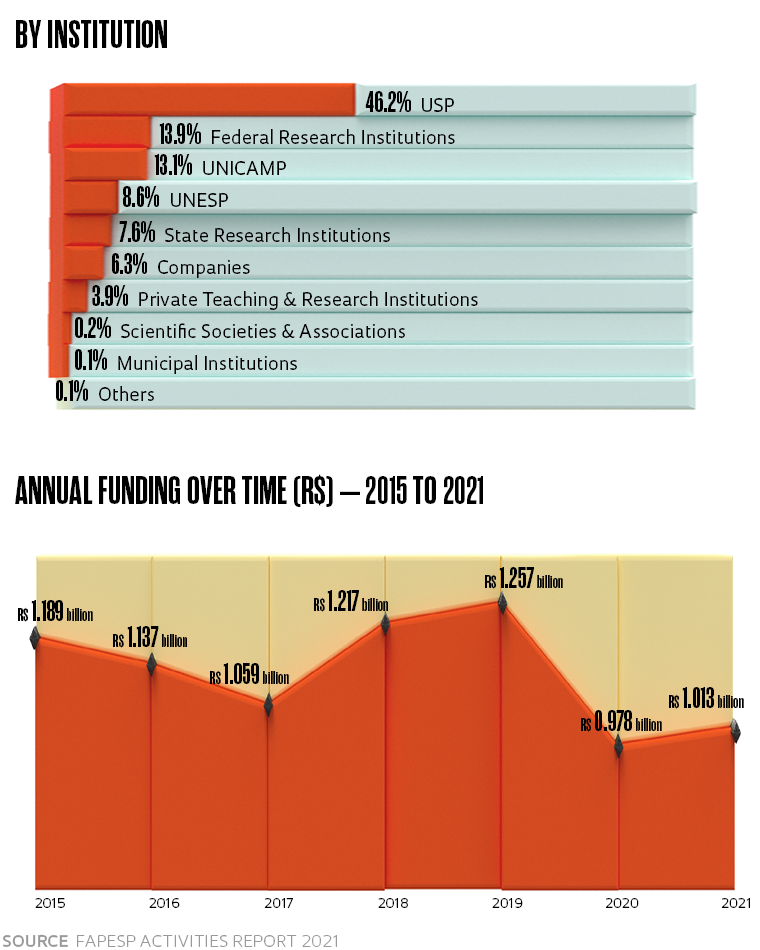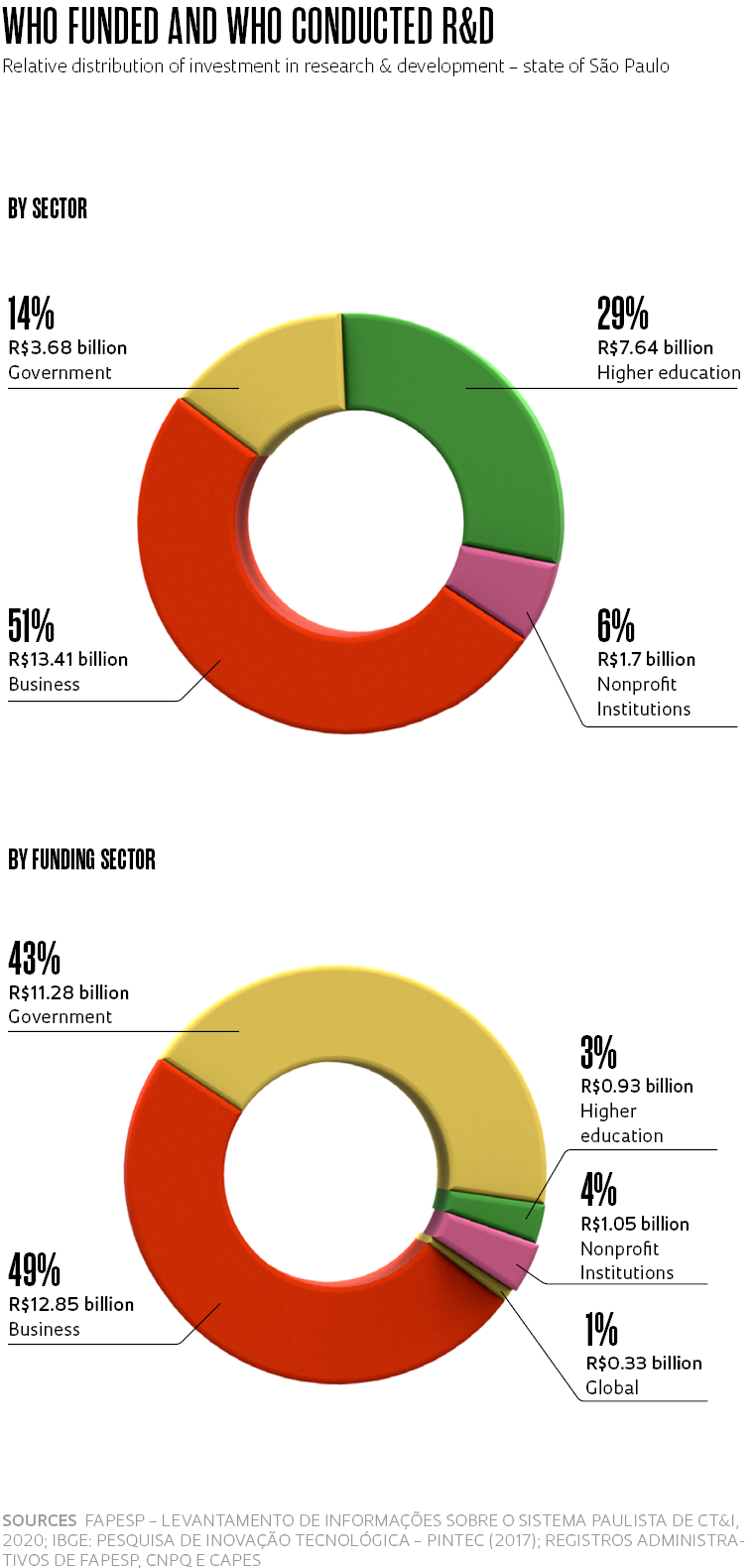In 2021, FAPESP invested R$1.01 billion in 19,692 research projects, 3.5% more than the R$978.3 million spent in 2020, but still below pre-pandemic levels: in 2019, it invested R$1.25 billion. A summary of the foundation’s activities and investments in the last year is provided in the FAPESP Activities Report 2021, released on September 1. The full version is available at fapesp.br/publicacoes, where it is also possible to access annual summaries dating back to 1962, the year FAPESP was created.
According to the report, the growth in expenditure in 2021 was primarily due to a 15.6% increase in funding allocated to research grants. Spending on research fellowships, however, was 10% lower than in 2020, as a result of a fall in demand observed more broadly across the country’s university and scientific system, probably due to the pandemic. “To help reverse this situation, FAPESP adopted a series of initiatives designed to stimulate research careers, creating new fellowships and grants, in addition to inaugurating a mentoring program for postdoctoral students in all fields of knowledge,” explained FAPESP President Marco Antonio Zago in a statement issued with the report.
One such initiative was the Direct Doctoral Fellowship in Medical Research, aimed at physicians seeking a career that includes both clinical activity and scientific research. Another was the π (Pi) Initial Research Grant, which supports research in all fields with a duration of five years and a budget of up to R$1 million per project, available to candidates who obtained their doctorate within the last 12 years starting their careers at institutions in the state of São Paulo. “Maintaining the flow of knowledge, the training of new human resources, and high-quality science is a constant challenge. For some time now, FAPESP’s scientific board has been striving to create more opportunities for young talent,” explained Scientific Director Luiz Eugênio Mello when announcing the new grant in December 2021.
The Research Career Mentoring Program was also launched, offering a series of online events aimed at scientists in academia, industry, and the government. The program includes online activities to complement the training of fellowship recipients, available at mentoriapd.fapesp.br, including videos about the research system in the state of São Paulo, how to establish a scientific career, and training in ethics, research integrity, project assessment, and activities related to careers in science, technology, and innovation.
The foundation ended 2021 with total grant and fellowship commitments—including those approved and currently ongoing—of R$1.86 billion. Zago highlights that it was a year of transition, during which society, academia, and businesses progressively resumed activities after the catastrophe of the pandemic. “FAPESP tried to stimulate the growth of research through its traditional strategies and innovative new initiatives,” he said. The health emergency and its declining impacts, which occupied much of the institution’s attention in 2020, continued to play a role in the actions of 2021. The foundation took part in two international calls, one with the Trans-Atlantic Platform for Social Sciences and Humanities (T-AP) and the other with the UN Research Roadmap for the COVID-19 Recovery, selecting projects that aim to mitigate the social effects of the pandemic and support public policies for economic recovery.
In 2021, contributions to the Research for the Advancement of Knowledge funding stream were increased, which funds basic and applied studies led by scientists from institutions in São Paulo. A total of R$563.6 million was invested in 9,251 projects, corresponding to 55.6% of all expenditure in the year (see chart on page 46). In the previous year, the total was R$450 million, representing 46% of the total. One of the highlights was the emphasis on long-term projects developed under the scope of Thematic Projects, Young Investigator Awards, and FAPESP’s 17 Research, Innovation, and Dissemination Centers (RIDCs). In the coming years, the foundation plans to create 18 new RIDCs, which fund pioneering research for up to 11 years, to be selected through the third public call for proposal of the program, launched in 2021.
Two new Engineering Research Centers (CPEs) began operating last year, one in partnership with Braskem, based at UNICAMP, and the other with GSK, based at the Albert Einstein Research and Teaching Institute, in addition to an Applied Research Center (CPA) dedicated to studies on early childhood, established together with the Maria Cecilia Souto Vidigal Foundation and based at the Teaching and Research Institute (INSPER). The CPEs and CPA created a solid cooperative model, allowing teams of researchers from companies to establish long-term collaborations (from five to ten years) with scientists at universities and scientific institutions to study topics with economic and social impact, such as biofuel engines, artificial intelligence, targeted therapy for cancer, and others. The centers are co-funded by FAPESP, partner companies, and their host institutions, which cover operating expenses and salaries linked to the projects.
Commitments assumed by the foundation via research projects and grants, both approved and currently ongoing, totaled R$1.86 billion at the end of 2021
In 2021, FAPESP allocated R$18.3 million to 13 different CPEs and CPAs created in partnership with companies such as Peugeot Citroën, EMBRAPA, Equinor, Shell, Grupo São Martinho, Koppert, and IBM, in addition to GSK, Braskem, and institutions such as the Maria Cecilia Souto Vidigal Foundation. In a joint call issued with Brazil’s Ministry of Science, Technology, and Innovation (MCTI) and the Brazilian Internet Steering Committee (CGI.br), six Artificial Intelligence CPAs were selected in 2021, which will operate in several Brazilian states. These applied research and engineering research centers have thus established themselves as the largest Brazilian collaboration between the business and academic sectors involving long-term projects.
FAPESP allocated R$86.6 million to funding innovation, equivalent to 8.6% of total spending in 2021, supporting 1,644 collaborative projects at universities, companies, and startups. The Innovative Research in Small Businesses (PIPE) program invested more than R$63 million in 1,346 research projects carried out by 209 startups and small businesses in 44 municipalities in São Paulo. In 2020, the program invested R$76.7 million in 1,305 projects.
To reinforce innovation at technology-based startups, a R$150-million agreement was signed with the São Paulo branch of the Brazilian Micro and Small Business Support Service (SEBRAE) to support 150 companies under the PIPE program and facilitate their access to the market. The program also created a new form of support: PIPE for Knowledge Transfer (PIPE-TC), designed to encourage the transformation of research results into real-world products, processes, and services, as well as the creation of startups. In this initiative, projects are led by researchers from small companies, like in other PIPE projects, but technologies with market potential must have been developed by institutions in São Paulo, which act as partners in the project and provide a co-lead researcher. The goal is to accelerate the journey from innovation to production.
Events marking FAPESP’s 60th anniversary began in 2021, ending in May 2022. The 60th Anniversary Conferences brought together specialists from across Brazil and abroad to debate strategic topics—seven of these events were held last year and another 10 this year. In July, the foundation launched the introduction and first of 10 digital installments of the book FAPESP 60 years – Science, Culture, and Development, offering insight into its activities over the last six decades.
The foundation’s sustainability agenda was reaffirmed in 2021. In May, the webpage “FAPESP and its Sustainable Development Goals” was launched, which details the programs and projects supported by the foundation related to each of the UN’s 17 goals for tackling poverty, protecting the environment, and fostering peace. Another highlight was a wide-reaching and ambitious partnership focused on the Amazon. The Amazon+10 Initiative is a collaboration between the National Council of Secretaries for Science, Technology, and Innovation Affairs (CONSECTI) and the National Council of State Research Support Foundations (CONFAP), in addition to several state research foundations (FAPs). The objective is to unite scientists from at least three partner states in projects aimed at preserving biodiversity, adapting to climate change, protecting traditional populations and communities, overcoming urban challenges, and promoting the bioeconomy in the Amazon.
The first public call involved 20 FAPs: Acre, Alagoas, Amapá, Amazonas, Distrito Federal, Espírito Santo, Goiás, Pará, Paraíba, Paraná, Pernambuco, Piauí, Maranhão, Mato Grosso, Rio de Janeiro, Rio Grande do Sul, Rondônia, Santa Catarina, São Paulo, and Tocantins. “The initiative was able to attract 20 foundations because the Amazon is a national issue due to its socio-biodiversity and the immense challenges facing the region,” said Marcia Perales, president of the Amazonas State Research Foundation (FAPEAM) and vice president of CONFAP, who participated in the event presenting the public tender.
Republish




